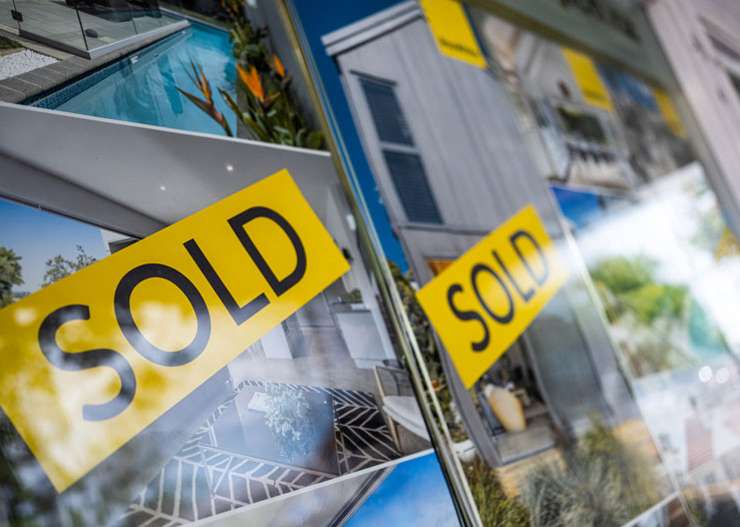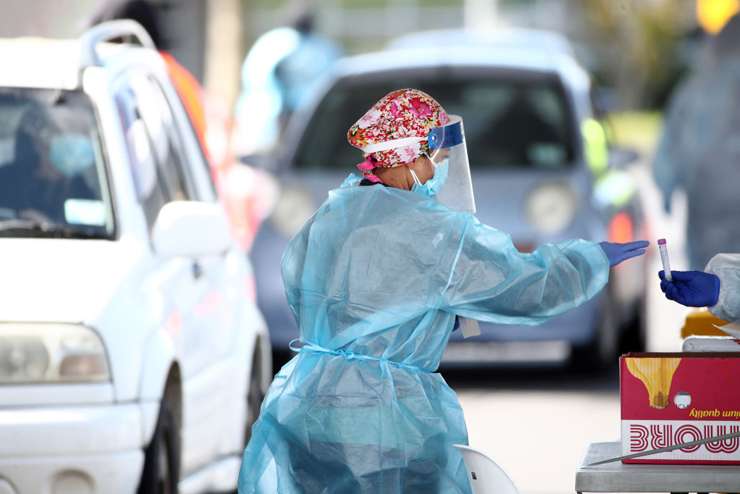Super-low interest rates are fuelling hunger in the housing market and are a big reason prices have remained strong throughout the Covid-19 ride, say economists.
Most still predict a fall in prices next year but not as sharply as initially forecast with some saying there might not even be a decline - and then prices will go up again.
Former BNZ chief economist Tony Alexander goes as far as to say the worst could be over: “There are a few things in play here which point towards a strong possibility that the weakness in the housing market may have been and gone and the general track for prices from here on out is more likely to be upward than downward.”
He’s not ruling out some short-term price weakness but thinks that will be over before the end of the year, if it happens at all, with prices rising “at a completely unforecastable pace” over 2021.
Start your property search
Alexander is also warning businesses to remember six months ago their biggest problem was finding staff and to be careful about laying people off because they will need them down the track.
Part of his reasoning for the continued strength in the housing market is the Reserve Bank’s talk about the potential for negative interest rates, which Alexander says cements in people’s heads rates are going to go lower and could stay low for a long time.
Another reason is behaviour after the first lockdown when a lot of people dived into the property market, showing the lockdown wasn’t much of an impediment.
Low for longer
He also points to a statement from the United States Federal Reserve chairman of a concern inflation had averaged over 1.6 per annum over the last 10 years but that was not close enough to the two per cent target.
The Federal Reserve intended running a policy where inflation would sit above 2 per cent for some time in order to eventually give a two per cent average and that is why the Kiwi dollar is almost two cents higher than the Greenback, Alexander says. “The main point is it reinforces here in New Zealand interest rates (will be) low for a long period of time.”
The hunger in the market is not likely to go away, Alexander says, with first home buyers and investors looking. “The investors have lost a lot of their hope of bargains but they’re still going to be in the market because you’re looking now at an environment where the term deposit rates are going to go even lower,” he says.

Tony Alexander says talk about negative interest rates is giving buyers confidence. Photo / Supplied
“One outcome, eventually, of this will be an environment where investors simply can’t find a property to buy and you will get entrepreneurs saying ‘let’s pool the money together and we will build build-to-let properties, which is a UK thing, so you’ll eventually get those investment vehicles.”
Alexander started out forecasting house price falls between 5 and 10 per cent then changed about two months ago to more towards the five per cent.
“Now I’m thinking maybe that’s it in the downward movement in the prices. I think for 2021 five per cent is quite conceivable upwards and for the rest of this year I’m going to pick average flat.”
The caveat is waiting to see what happens when the wage subsidy ends but Alexander points out the bulk of people losing jobs are in tourism and hospitality and are not property owners, a worldwide phenomenon, which means there won’t be unwilling sellers.
He also thinks next year banks will become more willing to lend – and says at some point everyone is going to say it looks like a vaccine is coming. When that happens predictions can be made about when the borders might open and foreign tourists start coming back and that would lead to a lift in positivity and in the economy which would help support the housing market.
“Eventually. We don’t know when we’re going to do that leaping forward.”
Modest decline
Dominick Stephens, Westpac’s chief economist, says the market has defied expectations and Westpac has revised its house price forecast up. “We now expect a fall of 2.5 per cent over the second half of 2020 and an increase of 8 per cent in 2021. We initially started with negative 7 for the remainder of 2020.”
There was a small fall in prices over April and May after the country came out of the first lockdown, prices were stable in June then rose sharply in July.
The negative 7 forecast was based on the average of past recessions but this one is different, Stephens says. “In all of those past recessions interest rates had risen sharply just prior and a big lift in interest rates was probably part of the cause of each of those recessions. This time you’ve got interest rates going down in the years prior then a big drop at the onset of the recession.”

Westpac chief economist Dominick Stephens says the market has defied expectations. Photo / Supplied
Stephens still thinks increasing unemployment over the remainder of this year will cause a modest decline in prices then, assuming the Covid 19 recession stabilises next year, expects a sharp increase in prices, saying this is what typically happens exiting recessions.
He’s been surprised at the level of activity in the housing market, though always expected a rebound of some kind, and thinks it’s partly due to getting to alert level one earlier than expected.
That may have caused a false sense of security, however, which may change with Covid-19 re-emerging in the community. “It was always going to be up and down as the alert levels went up and down. The main point is really that I think unemployment is going to lift between now and the end of the year and the increasing pressure on the economy from that will trickle through to the housing market despite really low interest rates.”
Remarkable winter
Two big forces are acting on the market – a very weak economy and very low interest rates, leading to an uncertain outlook and people’s personal circumstances and risk tolerance are factors in whether to buy or sell now or wait.
But he also cautions that while he is forecasting a big lift in prices next year because interest rates have fallen so much, one day they will go up again. “When they do it’s going to be quite painful for the housing market and none of us knows when that’s going to happen.”
Jarrod Kerr, Kiwibank’s chief economist, expects a slight pull back on prices into next year but not as savagely as first thought.
He, too, says the country got through the lockdowns far better than expected and points to pent-up demand after the first lockdown meeting an interest rate war with banks slashing rates.
That combination enticed people into the market, and eligibility also improved through the postponement of LVR restrictions and the lowering of serviceability caps.
Kiwis are still coming home from overseas and may be showing up as first home buyers, as well.
“Basically, everything we’ve seen over the winter period has been remarkable. House prices are running at a clip over 9 per cent compared to this time last year. Anyone thinking about what housing markets are likely to do going into the greatest pandemic and economic shock in 100 years – it really is remarkable we’ve held up this way.”
Kiwibank is wary about what might happen when the wage subsidies wear off as there is likely to be a lift in unemployment which may take some of the steam out of the market into early next year.
“But broadly speaking we think the property market has done particularly well through this period. It’s being driven by record low interest rates and people hunting for yield, and there’s good yield in the regions.
“If you’re getting a 2.5 per cent mortgage rate, and a lot of properties in the regions are yielding 4, 5 6 per cent, then it’s a great alternative investment, better than cash.”
Kiwibank had forecast a 9 or 10 per cent decline at the start of the first lockdown and possibly up to 15 per cent or more depending on the severity.

Barfoot and Thompson reported strong Auckland house sales for August. Photo / Ted Baghurst
“We’ve had a massive swing in our mindset and we’re now saying minus 5 or 6 per cent to the first quarter of next year – we like the fact we’re looking a little pessimistic here, it’s nice to be surprised on the upside.”
However, if the impact of unemployment coming through is not as bad as modelling suggests there might not even be a decline in prices, Kerr says, and instead the market takes off again in the second half of next year, supported by the under-supply in affordable housing and the lower interest rates.
Analysis and forecast company Infometrics initially thought an 11 per cent fall in prices when the original lockdown occurred then pulled that back to about a six per cent drop by the end of next year.
There will probably still be falls next year, chief forecaster Gareth Kiernan says, but the mortgage holiday scheme was extended and the labour market deterioration hasn’t happened anywhere near expectations.
While not wanting to put a figure on it, he says prices will be down but by less than the six per cent drop Infometrics’ economists were thinking a month or so ago.
“There’s been a number of aspects of how the economy’s performed we have been surprised about. With relation to the housing market one is obviously the strength of demand but that may be a function of the fact so far there’s been a lot of Government support for the labour market in particular and so you haven’t had those job losses we were really worried about four or five months ago.”
And with the borders closed people haven’t been able to go on overseas holidays so have been channelling spending into other areas, including property and renovations.
Mortgage relief
Mike Jones, senior economist with the ASB, says the bank has been the least pessimistic, forecasting a six per cent fall by March of next year and since revising that down to a 2.8 per cent fall.
The expectation interest rates will keep falling, and possibly dramatically, means there is a lot of mortgage relief coming through and this will continue over the next 12 months.
“Those lower mortgage rates do seem to be stimulating the market to a greater extent than most people thought, and then we’re seeing the fiscal stop-gap measures that have helped plug up the labour market extended as well, so the wage subsidy, the mortgage holiday scheme, meaning the housing market is going to continue to feed off that extra stimulus a little longer.”
There are, however, factors casting some pretty big shadows over the market, including higher unemployment and a sharp slow in population growth.
“They’ve always been the two big bugbears for our housing view. What’s really happened is the impact of those has just been delayed by a range of factors, including the fact stimulus has kept pumping for longer.”
The peak in unemployment now looks as if it could occur in the middle of next year and unemployment is clearly rising.
“One thing that’s been interesting, though, is while the numbers of migrants have slowed right down the mix is slightly more supportive of the housing market. The fact we’re seeing a lot of Kiwi expats that are relatively well-heeled return and looking to settle back in New Zealand a little bit earlier than they would have in a non-Covid world is providing a little bit more demand into the housing market and I think we’re seeing that in auction rooms.”
Those who have sounded the all-clear have been a “tad hasty”, though. “We were always saying it’s going to take a while for the labour market to be impacted and for those impacts to flow through to the housing market. It’s still coming.”

Testing for Covid-19 during the lockdown in Auckland. Photo / Getty Images
Liz Kendall, a senior economist with the ANZ, says the bank still expects some downward pressure on house prices at the end of this year and into next year but no longer expects such a large fall with mortgage rates set to continue to decline into next year.
“Potentially, we could be looking at a situation where the housing market is quite resilient but we’re balancing that against the possibility the recent life we’ve seen in the market could be short-lived if the economy really starts to come under strains.
“It is a tricky one to balance our thinking around those things and I think we’re quite happy to wait and see what happens as we move past the seasonal strength we’re seeing through winter as the lockdown has ended, as domestic tourism’s been propping up some of those regional tourist centres and as we move into the latter part of this year when the closed border’s going to become more of a problem.
“That’s where we’ll start to see those housing market impacts if they’re going to happen.”
The ANZ, too, has been surprised at the fervour in the market with potential buyers appearing keen to take up the low mortgage rates. “I suppose we would have expected a little more caution given we are in a very uncertain economic environment. Unemployment is rising but those people who are not immediately affected can be very enthusiastic home purchasers.”
The downturn is not playing out as it usually would because of the wage subsidies, making it an unusual time for trying to predict what’s happening in the housing market.
The wage subsidies have helped a lot of firms meaning the negative consequences of the downturn are not playing out as they usually would.
At the start of the first lockdown the ANZ forecast a cautious 14 or 15 per cent price fall but has revised that to a six per cent fall at the end of this year and into the second half of next year.













































































